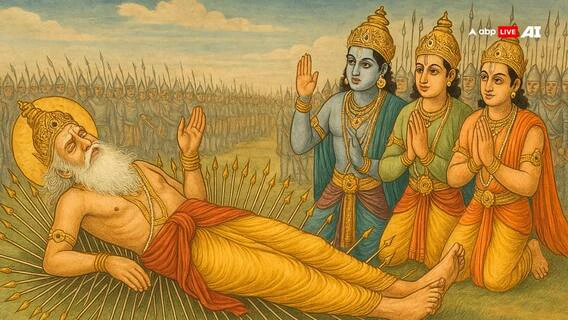In the grand epic of Mahabharat, many warriors fought bravely, but none had a death as mysterious as Bhishm Pitamah. Known for his unshakable vows, loyalty to the throne of Hatinapur, and martial skills, Bhishm’s end came not with a single blow, but as he lay wounded, consciously choosing his time of death.
This act wasn’t born out of pain or defeat. It was rooted in a divine boon, the rare gift of Iccha Mrityu, or death at will. But what led to this moment? Why did one of the greatest warriors in Hindu mythology choose an agonising fate? The answer unveils one of the most powerful teachings of dharm, devotion, and inner mastery.
The Boon Of Ichha Mrityu
Bhishm, originally known as Devarat, was the son of King Shantanu and Goddess Ganga. When Shantanu wished to marry Satyavati, her father laid a condition, that only her children would inherit the throne. To honour his father, Devarat renounced not only his claim to the throne, but also tool a vow of lifelong celibacy.
Impressed by this sacrifice, Shantanu blessed his son with a divine boon, Iccha Mrityu. This boon gave Devarat the ability to choose the time and manner of his own death. From that moment, Devarat became Bhishm, the one who took the ‘terrible vow.’ This vow made him feared, invincible, and respected on every battlefield.
Role Of Bhishm In Kurukshetra War
Bhishm was deeply loyal to the throne of Hastinapur, but as he had watched the Pandavs grow up, his sympathies were with them. Due to his vow, he had to side with the Kauravs during the Kurukshetra War. For ten days, he led the Kaurav army and inflicted heavy losses on the Pandav side.
But Bhishm had one limitation. He refused to harm Shikhandi, a warrior who was born as a woman in previous birth. Knowing this, Arjun used Shikhandi as a shield and rained arrows upon Bhishm. He got pierced with countless shafts until he fell, not dead, but suspended painfully on a bed of arrows.
Why Bhishm Did Not Die Immediately
Though wounded, Bhishm didn’t allow his soul to leave his body. With the help of his boon of Ichha Mrityu, he chose to wait until the auspicious Uttarayan period, a six-month phase when the sun begins its northward journey. In Hindu belief, dying during Uttarayan ensure moksh from the cycle of birth and rebirth.
So, Bhishm lay on his bed of arrows, enduring pain, reflecting on dharm, and waiting for the right cosmic moment to release his soul. He used this time to impart deep wisdom to Yudhishthir on governance, ethics, and spirituality.
The Immortal Death
Bhishm’s death wasn’t just a warrior’s end. I became a symbol of willpower, discipline, and dharmic wisdom. Through the painful bed of arrows, he showed that even in suffering, one can remain conscious, aware, and spiritually committed. Ichha Mrityu was not only a boon, it was a responsibility. Bhishm used it not for personal gain, but to serve righteousness, protect dharm, and guide the future generations.
This story of Mahabharat reminds us that true strength lies not in might, but in restraint, sacrifice, and divine wisdom. His ability to hold death at bay until the right moment is a reminder of power that lies within oneself.
